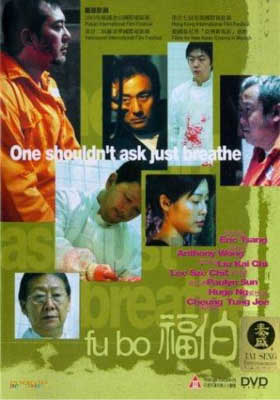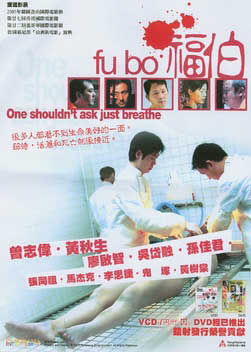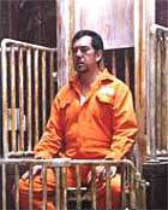
Reviewed by YTSL

Before anything else: Here’s handing out an advance
warning that this Category III rated independent feature, over whose proceedings
death looms large, is one which is guaranteed to make its viewers squirm
uneasily in their seats. Judging from my own reactions, chances also
are high that even seasoned viewers of such as “Remains of a Woman”, “Dr.
Lamb” and “The Untold Story” will have cause to at least temporarily turn
vegetarian -- if only to ensure that they’ll not upchuck any food -- in the
hours following their taking in a screening of a dramatic offering that actually
isn’t strictly a horror film but, nonetheless, may leave some members of
its audience feeling considerably shaken plus stirred.

To be sure, much of what occurs in FU BO clearly is everyday in nature to the movie’s protagonists. And bar for one isolated sequence that occurs late into this set in Macau work, the likes of cinematographer Wong Ping Hung plus art director Wong Sau Ping look to have sought to give the film a more artlessly mundane than artfully experimental look. Still, when a production matter of factly contains more than one violent murder, mutilated naked corpses (one of which is that of a drowned man who had had metal weights and a baby cruelly implanted into him) and even more physically damaging autopsies (at least one of which requires the sewing up of large plus deep surgical incisions -- an act which, more than incidentally, this offering’s audience gets “treated” to close up views of -- upon its completion)... Suffice to say that, more than one week on, I can’t help but feel rather faint upon recalling these and other appetite-wrecking sights that may have been “not real” since I viewed them in a cinema but surely do have real life equivalents.

Early on in the movie, this FU BO in question
assented to divulge a few details about his background to a curious younger
and, as it turned out, not very long-lasting colleague. One of these
was that his father had been the immediate predecessor of the current medical
examiner (played by Joe Cheung) and suggested that if only he had been brainier,
that’s the job that he would have had instead. Another was that his
mother had also worked with the dead (as a funeral home’s make-up artist)
and, as such, he saw it as rather natural that he too would end up doing
so. Alternatively, it was only later on in this offering -- whose generally
somber “feel” probably is related to its chiefly taking place in a morgue
-- that it gets made known that this largely quiet, unsmiling, middle-aged
fellow also has familial ties to a working woman (played by an unglamorous
looking Pauline Sun) and a young son (who looked to have been the apple of
both parents’ eyes).

Similarly, the links between FU BO’s distinctly ungregarious titular character and the main characters in two others of its tales aren’t ones that are readily apparent. Consequently, the sections of the film that focus on a professional killer seemingly on the edge of a nervous breakdown and the foreign -- more specifically, Portuguese -- cook for death row inmates (two of whom are played by Anthony Wong and Eric Tsang) who also takes it upon himself to record their dying wishes feel quite independent of that which voyeuristically reveals quite a bit about the insular world of morgue assistants as well as each other.
If this pair of personalities had been more interesting (or had more compelling tales to relay), I wouldn’t have minded this state of affairs too much. As it was, I found myself wishing upon the conclusion of this apparently determinedly downbeat effort that its makers had entirely focused, instead, on chronicling the blood-splattered -- and thus impossible to think of as entirely color-less -- world of the titular FU BO, his colleagues (none of whom are particularly garrulous men but look to have their share of interesting stories and opinions to impart), and the individuals deeply loved by the sad-eyed man who I found myself feeling pretty strongly plus sorry for.
My rating for the film: 7.